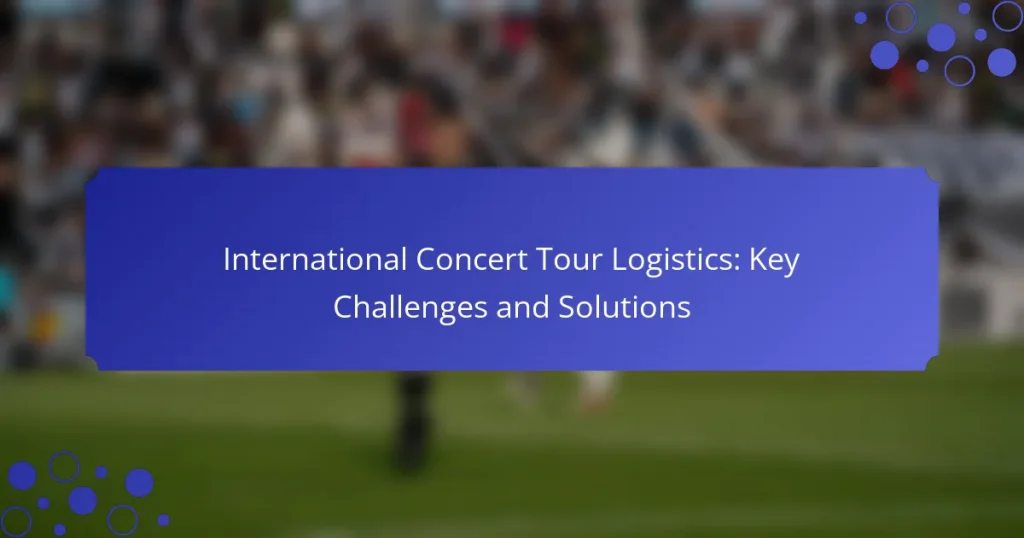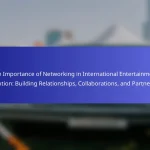International concert tour logistics encompass the essential components of transportation, venue selection, equipment management, and scheduling. Effective logistics planning is crucial for ensuring compliance with regulations such as visa requirements, customs procedures, and safety standards, which can significantly impact the success of a tour. This article outlines the challenges faced in international concert logistics and offers solutions, including the establishment of detailed itineraries, collaboration with local promoters, and the use of technology for real-time tracking. By addressing these key areas, the article aims to provide insights into optimizing logistics for a seamless concert experience for both artists and audiences.

What are the key components of international concert tour logistics?
The key components of international concert tour logistics include transportation, venue selection, equipment management, and scheduling. Transportation involves moving artists, crew, and equipment across borders efficiently. Venue selection requires assessing location, capacity, and technical requirements for performances. Equipment management ensures that sound, lighting, and stage setups meet specific performance standards. Scheduling is crucial for coordinating rehearsals, performances, and travel itineraries. Each component must work in harmony to ensure a successful tour. Proper logistics planning can significantly impact the overall success of the concert series.
How does planning impact the success of an international concert tour?
Planning significantly impacts the success of an international concert tour. Effective planning ensures that logistics, such as travel, accommodation, and equipment transport, are seamlessly coordinated. This reduces the risk of delays and complications during the tour. Additionally, planning allows for proper budgeting, which is crucial for maximizing profitability. A well-structured schedule helps in optimizing performance times and locations, increasing audience turnout. Historical data shows that tours with comprehensive planning report up to 30% higher ticket sales. Furthermore, artist satisfaction improves when all logistical aspects are pre-arranged, leading to better performances. Ultimately, meticulous planning translates into a smoother operation and enhanced overall success of the tour.
What are the essential elements of logistical planning for concerts?
The essential elements of logistical planning for concerts include venue selection, transportation, equipment management, staffing, and scheduling. Venue selection involves choosing an appropriate location that meets capacity and technical requirements. Transportation logistics ensure that artists, crew, and equipment arrive on time. Equipment management covers the setup, maintenance, and dismantling of sound and lighting systems. Staffing entails hiring and coordinating personnel for various roles, including security and technical support. Scheduling is critical for organizing rehearsals, sound checks, and performance times. These elements are interconnected and must be carefully coordinated to ensure a successful concert.
How does venue selection influence logistics in concert tours?
Venue selection significantly influences logistics in concert tours. The choice of venue affects transportation routes for equipment and personnel. Venues with limited access may complicate loading and unloading processes. Additionally, the venue’s location impacts accommodation arrangements for staff and artists. Venue capacity influences ticket sales and overall revenue. Different venues may have varying technical requirements, affecting sound and lighting setups. Weather considerations can also play a role, especially for outdoor venues. Ultimately, proper venue selection streamlines logistics and enhances the overall concert experience.
What challenges are commonly faced in international concert tour logistics?
International concert tour logistics face several challenges. These include customs regulations, which can delay equipment transport. Visa issues for artists and crew can complicate travel. Language barriers may lead to miscommunication with local vendors. Coordinating schedules across different time zones poses logistical difficulties. Venue availability and capacity constraints can limit performance options. Weather conditions can disrupt travel and event planning. Lastly, managing budgets across multiple currencies can create financial challenges. Each of these factors can significantly impact the success of an international concert tour.
What are the typical transportation issues encountered during concert tours?
Typical transportation issues during concert tours include logistical challenges, equipment damage, and scheduling conflicts. Logistical challenges arise from coordinating multiple vehicles for crew and equipment. Equipment damage can occur due to improper handling or harsh travel conditions. Scheduling conflicts often arise when tour dates overlap with venue availability. Transportation delays can result from traffic, weather, or mechanical failures. These issues can lead to increased costs and reduced performance quality. Efficient planning and contingency measures are essential to mitigate these problems.
How do cultural differences affect logistics planning?
Cultural differences significantly affect logistics planning in international concert tours. These differences influence communication styles, negotiation tactics, and decision-making processes. For example, some cultures prioritize direct communication, while others value indirect approaches. This can lead to misunderstandings in scheduling and resource allocation. Additionally, cultural attitudes toward time can vary; some cultures may view punctuality as essential, while others may have a more flexible approach. Such differences can impact the timing of deliveries and coordination of events. Furthermore, local customs and practices must be respected to ensure smooth operations. Ignoring these cultural nuances can result in logistical challenges and operational delays. Research indicates that successful logistics planning incorporates cultural awareness to enhance collaboration and efficiency.
What solutions can be implemented to overcome logistical challenges?
Implementing advanced planning and coordination can help overcome logistical challenges. Effective communication among all stakeholders is crucial. Utilizing technology for real-time tracking improves efficiency. Establishing contingency plans for unexpected issues is essential. Collaborating with local partners can enhance resource access. Streamlining transportation processes reduces delays. Regularly reviewing logistics strategies fosters continuous improvement. These solutions are supported by successful case studies in the event management industry.
How can technology improve logistics management for concert tours?
Technology can significantly enhance logistics management for concert tours by streamlining operations and improving communication. Advanced software solutions enable real-time tracking of equipment and personnel. This ensures timely arrivals and reduces delays. Automated inventory management systems help monitor gear availability and usage efficiently. Mobile applications facilitate communication between tour managers, crew, and venues. Cloud-based platforms allow for easy sharing of schedules and updates. Data analytics can optimize routing and transportation choices based on historical performance. These technological advancements contribute to smoother logistics processes, ultimately leading to successful concert tours.
What role does effective communication play in overcoming logistical hurdles?
Effective communication is crucial in overcoming logistical hurdles. It ensures all team members are aligned on goals and responsibilities. Clear communication minimizes misunderstandings that can lead to delays. For instance, timely updates about venue changes can prevent last-minute issues. Effective communication also facilitates coordination among various stakeholders, including artists, crew, and vendors. Studies show that teams with strong communication practices are 25% more productive. In concert logistics, this translates to smoother operations and improved event execution.

How do regulations impact international concert tour logistics?
Regulations significantly impact international concert tour logistics by dictating compliance requirements for artists and crew. These regulations encompass visa requirements, customs procedures, and safety standards. For instance, countries often require specific work permits for foreign performers. Additionally, customs regulations can delay equipment transport due to inspections and tariffs. Safety regulations mandate adherence to local health and safety codes, affecting venue selection and stage setup. Non-compliance can result in fines or tour cancellations, as seen in various high-profile cases. Thus, understanding and navigating these regulations is essential for successful international concert logistics.
What are the key regulations that affect concert touring across borders?
Key regulations that affect concert touring across borders include customs regulations, visa requirements, and taxation laws. Customs regulations dictate the import and export of equipment and merchandise. Each country has specific rules regarding what can be brought in and the associated duties. Visa requirements vary by country and can include work permits for performers and crew. These visas must be secured before traveling. Taxation laws can affect income earned during performances. Some countries impose withholding taxes on foreign artists. Compliance with these regulations is essential for successful international tours. Failure to adhere can result in fines or performance cancellations.
How do visa requirements complicate international concert logistics?
Visa requirements complicate international concert logistics by creating barriers for artists and crew members. Each country has its own visa regulations that must be adhered to. These regulations can lead to delays in securing necessary documentation. Delays can result in missed deadlines for travel and performance schedules. Additionally, visa applications often require extensive paperwork and proof of financial stability. This adds complexity to the planning process. Furthermore, some countries may deny visa applications without clear reasons. This unpredictability can jeopardize concert dates and financial investments. Overall, navigating visa requirements is a critical challenge in organizing international concerts.
What customs considerations must be addressed for touring equipment?
Customs considerations for touring equipment include declaring all items, understanding import/export regulations, and obtaining necessary permits. Accurate documentation is essential to avoid delays at borders. Each country has specific rules regarding temporary imports for performance equipment. Some items may require bonds or duty payments. Familiarity with the Harmonized System codes helps classify equipment correctly. Additionally, ensuring compliance with local laws can prevent confiscation. Engaging a customs broker can streamline the process and mitigate risks. These considerations are critical for smooth international tours.
What strategies can be used to navigate regulatory challenges?
Establishing strong relationships with regulatory bodies is essential for navigating regulatory challenges. Engaging with local authorities can provide insights into compliance requirements. Conducting thorough research on regulations in each country is crucial. This ensures awareness of specific legal obligations. Developing a compliance checklist can streamline adherence to regulations. Training staff on regulatory requirements enhances organizational readiness. Utilizing legal counsel familiar with international regulations is advisable. This helps in interpreting complex legal frameworks effectively. Regularly reviewing and updating compliance strategies is necessary to adapt to changing regulations.
How can artists and promoters stay informed about changing regulations?
Artists and promoters can stay informed about changing regulations by subscribing to relevant industry newsletters. These newsletters provide updates on legal changes and compliance requirements. Additionally, attending industry conferences and workshops enhances knowledge of regulations. Networking with legal experts and industry peers also offers insights into regulatory updates. Following official government websites and social media accounts ensures access to the latest information. Joining professional organizations can provide resources and support regarding regulatory changes. Regularly reviewing industry publications keeps artists and promoters aware of new developments.
What resources are available to assist with compliance in different countries?
Various resources assist with compliance in different countries. Government websites provide regulations and guidelines specific to each country. International organizations, such as the World Trade Organization, offer compliance frameworks. Legal firms specializing in international law can provide tailored advice. Compliance software solutions help manage regulatory requirements effectively. Trade associations often publish best practice guides for industry compliance. Additionally, consulting firms can offer expertise in navigating complex regulations. These resources help ensure adherence to local laws and regulations during international concert tours.

What best practices should be followed for successful international concert tour logistics?
Successful international concert tour logistics require meticulous planning and execution. First, establish a detailed itinerary that includes travel dates, venues, and accommodations. Ensure compliance with local regulations and customs requirements in each country. Collaborate with local promoters and logistics providers for seamless coordination. Utilize technology for real-time tracking of equipment and personnel. Implement a robust communication plan among all team members. Prepare for contingencies by having backup plans for transportation and accommodations. Regularly review and adjust logistics based on feedback and performance. These practices lead to smoother operations and enhanced artist and audience experiences.
How can tour managers ensure a smooth logistical process?
Tour managers can ensure a smooth logistical process by meticulous planning and coordination. They should create detailed itineraries that outline every aspect of the tour. This includes travel arrangements, accommodation, and performance schedules. Effective communication with all stakeholders is crucial. This involves regular updates with artists, crew, and vendors. Utilizing technology for real-time tracking can enhance efficiency. For instance, GPS and scheduling apps can streamline transportation logistics. Additionally, having contingency plans for unexpected issues is vital. Research indicates that 80% of successful tours are attributed to thorough logistical management. Therefore, implementing these strategies can significantly reduce complications during the tour.
What are the key factors in developing a comprehensive tour schedule?
The key factors in developing a comprehensive tour schedule include time management, venue selection, and resource allocation. Time management ensures that all activities fit within the tour timeline. Venue selection involves choosing locations that accommodate the expected audience size and logistical needs. Resource allocation includes budgeting for transportation, accommodations, and equipment. Additionally, coordination with local authorities is crucial for permits and regulations. Communication with all team members ensures everyone is informed and aligned. Finally, flexibility in the schedule allows for adjustments due to unforeseen circumstances. These factors collectively enhance the efficiency and success of the tour.
How can contingency planning enhance logistics management?
Contingency planning enhances logistics management by preparing for unexpected events. It allows organizations to develop alternative strategies for potential disruptions. This preparation minimizes delays and ensures timely delivery of goods and services. For example, a study by the Journal of Business Logistics found that companies with robust contingency plans experienced 30% fewer disruptions. Additionally, contingency planning improves resource allocation during crises. It enables teams to respond quickly to changing circumstances. Efficient response mechanisms reduce costs associated with logistics failures. Overall, contingency planning is vital for maintaining smooth logistics operations.
What practical tips can improve logistics efficiency for concert tours?
To improve logistics efficiency for concert tours, implement detailed planning and coordination. Establish a comprehensive timeline that outlines all logistics tasks. Utilize technology for real-time tracking of equipment and personnel. Optimize transportation routes to minimize delays and costs. Collaborate closely with local vendors for timely support and resources. Conduct regular rehearsals to identify potential logistical issues in advance. Maintain open communication among all team members to ensure smooth operations. These practices can significantly enhance the overall efficiency of concert tour logistics.
How can collaboration with local partners optimize logistics?
Collaboration with local partners can optimize logistics by leveraging their regional expertise and resources. Local partners understand the specific challenges and regulations of the area. They can provide insights into efficient transportation routes and local suppliers. This collaboration can lead to reduced costs and improved delivery times. For instance, studies show that companies utilizing local partners can achieve up to a 30% reduction in logistics costs. Additionally, local partners can facilitate quicker responses to unexpected issues. This adaptability enhances overall logistical efficiency during international concert tours.
What tools and software are recommended for managing concert logistics?
Trello, Asana, and Eventbrite are recommended tools for managing concert logistics. Trello offers a visual project management system that helps organize tasks and timelines. Asana provides task assignments and progress tracking for team collaboration. Eventbrite facilitates ticket sales and event promotion, streamlining attendee management. Additionally, Google Workspace enhances communication and document sharing among team members. These tools improve overall efficiency in concert logistics management.
International Concert Tour Logistics encompass the essential components of transportation, venue selection, equipment management, and scheduling, all crucial for a successful tour. The article analyzes how meticulous planning significantly impacts tour success, addressing challenges such as customs regulations, visa issues, and cultural differences. It highlights best practices for logistical management, including the use of technology for real-time tracking and effective communication strategies. Additionally, the article discusses the importance of collaboration with local partners and compliance with regulations, providing practical tips for optimizing logistics and enhancing overall efficiency in concert tours.


